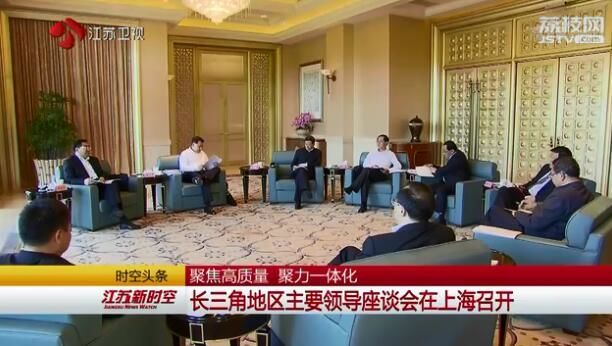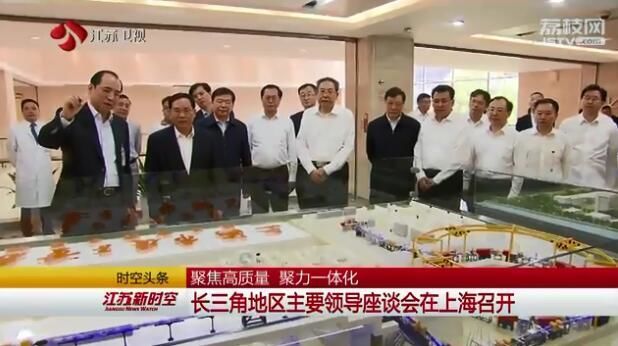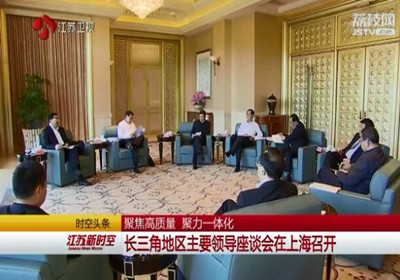A three-year action plan has been approved by officials of Shanghai and Jiangsu, Zhejiang and Anhui provinces who gathered last Friday in Shanghai to map out the blueprint for the integrated development of the Yangtze River Delta region. The plan aims to build the region into a world-class city cluster by 2020.

Authorities from Shanghai and its three neighboring provinces of Zhejiang, Jiangsu and Anhui agreed on Friday on a three-year action plan for the integrated development of the Yangtze River Delta and nearly a dozen collaborative projects to increase the region's competitiveness on a global scale.
The agreements, signed at the 14th symposium of the main leadership of the Yangtze River Delta, indicated that by 2020, the region aims to become a national demonstration zone for new development concepts, a world-class urban center and an Asia-Pacific gateway for global resource allocation.
To achieve that, the three-year strategic plan for the period between 2018 and 2020 for the region's development has been formulated to clarify the tasks, timetable and road map for the coming years, Li Qiang, Party Secretary of Shanghai, told the media last Friday evening.
With a GDP of 19.5 trillion yuan or $3.08 trillion last year, the Yangtze River Delta-which is at the convergence of the Belt and Road Initiative and the Yangtze River Economic Zone-accounted for roughly 25 percent of the nation's GDP, official statistics show.

The formulation of the three-year plan signified that the integrated development of the region has made substantial progress, and Shanghai will play a strategic role as a world-class core city, Li said.
Based on the plan, 11 cooperation projects were also signed on Friday to facilitate coordination and links in areas such as planning, reform, innovation, urban facilities, transportation networks and public services.
For example, authorities from the region agreed to establish the Yangtze River Delta Integrated Development Investment Fund to facilitate cooperation with related financial organizations to support major trans-regional infrastructure construction, ecological environment management and other related fields.
In a previous interview in January, Li was quoted as saying that we have reached a point when the regional cooperation of the Yangtze River Delta region must be deepened comprehensively as regional collaboration represents a general trend in the development of the world economy.
However, differences in detailed planning for Shanghai and Jiangsu, Zhejiang and Anhui provinces in aspects such as industrial development and policies on residents' livelihoods, have hindered some collaborative projects, Li said at a panel discussion during this year's National People's Congress in March.
Dozens of dead-end roads between the provinces and the municipality because of existing residential communities or rivers are one example.

According to the plan, a new intercity railway network is being planned to improve the connectivity of infrastructure in the region.
It will also be a pilot region for the trial of 5G network.
A regional connected credit system will be implemented. Under the system, a credit defaulter who is blacklisted in one place will also be blacklisted by the other places of the region.
Meanwhile, 17 dead-end roads at provincial boundaries will be completed and open to traffic to improve transport capacity within the region.
A “corridor of science and technology innovation” will be built along the G60 Expressway.
Some other programs to improve people’s livelihood will also be promoted, such as an integrated medical insurance system that allows patients to pay their medical bills whenever they seek treatment and an integrated database for people to check their own information even when they are not at hometowns.
A joint effort will be made to combat pollution, improve water and air quality and build up a monitoring network.
They will cooperate in building a world-class ecological island in Chongming, promoting the ecological business belts between Nanjing and Hangzhou and along the Huaihe River and constructing the ecological protection experimental zone along the Great Canal.
They will also cooperate in water pollution control in key areas to ensure drinking water security in the region.
(Source: Jiangsu International Channel)






